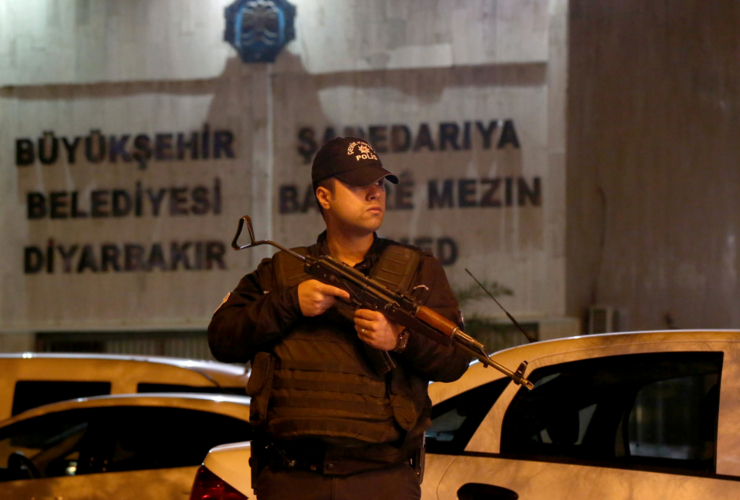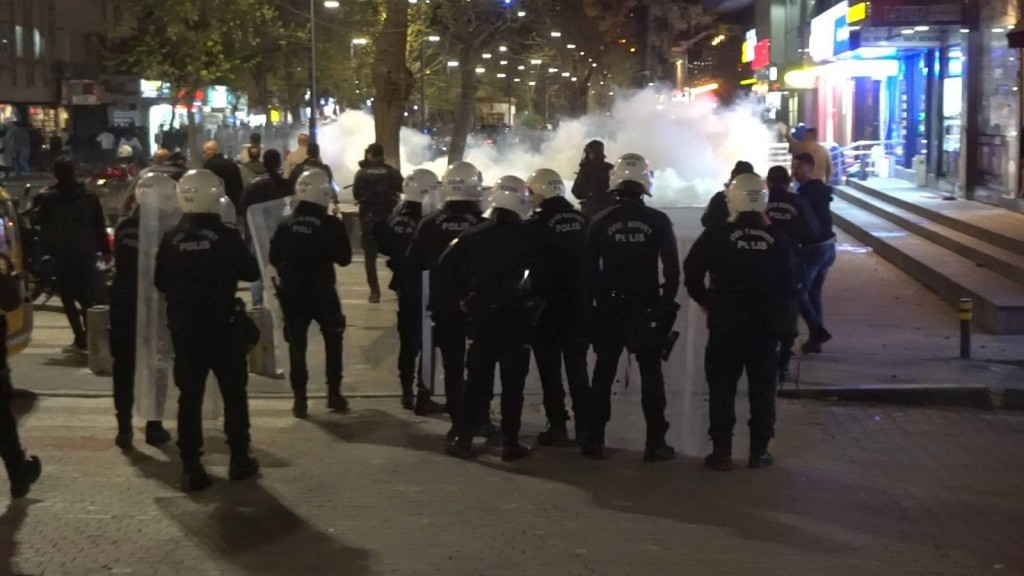Kurdish journalists jailed in Turkey face particular challenges in defending their rights in court. In many cases, they are imprisoned hundreds of miles from the court in which they are being tried. The distances involved hamper the defendants’ family vists and access to legal support. Some defendants never appear in person before a judge or hear evidence in person from witnesses against them, instead forced to appear via a video-conference system known by the acronym SEGBİS (Ses ve görüntü bilişim sistemi), the use of which has grown nearly twentyfold since 2013. Equipment failures and poor translation add to the difficulties.
For this article, we analyzed the cases of jailed Kurdish journalists and highlighted violations to the defendants’ right to a fair trial. These violations appear to follow common patterns, as highlighted above and described in more detail below.
Despite Turkey’s international obligations, five journalists with the Dicle News Agency (DİHA) – Nedim Türfent, Ziya Ataman, Seda Taşkın, İdris Sayılğan and Abdülhalik Kaya – were recently denied the right to attend their hearings and defend themselves in person. Worse still, in the cases of Ataman and Sayılğan, court officials claimed that the SEGBİS video-conferencing system experienced a technical failure, preventing the defendants from even following the proceedings.
Nedim Türfent
In December 2017, DİHA photojournalist Nedim Türfent was sentenced to eight years and nine months in prison for “membership in a terrorist organization” after a trial marked by numerous injustices.
Although all five hearings in Türfent’s case were held at the 2nd High Criminal Court in Hakkâri, southeastern Turkey, Türfent was transferred to five different prisons over the course of his pre-trial detention before being placed in a high-security facility in Van, more than 200 kilometres from Hakkâri.
Officials rejected Türfent’s repeated applications to attend his trial in person. As a result, Türfent was unable to defend himself in person in court or face the witnesses who testified against him.
Furthermore, there were serious problems with the interpreter during the third and fourth hearings of the trial when Türfent chose to give evidence in his native Kurdish. The interpreter spoke Türfent’s variety of Kurdish, Kurmanji, poorly, forcing Türfent to repeatedly request corrections. For instance, in reaction to a statement by a secret witness that Türfent had spoken to a “blue eyed, blonde-haired member of a terrorist organization”, Türfent testified: “I went to many places and saw a great number of people. But I definitely did not meet with a member of a terrorist organization.” This was translated by the interpreter as: “I am a journalist, journalists can meet everyone and make news about it.” The court corrected the record after Türfent intervened.
Furthermore, throughout the duration of the trial, Türfent at no time had access to a computer or a library to assist him in preparing his defence.
İdris Sayılğan
On October 24, 2016, DİHA reporter İdris Sayılğan was arrested in his home of Muş, in eastern Turkey. However, he was then sent to a prison in Trabzon, some 450 kilometers away on Turkey’s Black Sea coast, where he is currently being held.
Sayılğan’s trial is taking place in Muş, where his family and legal team are also based. His parents have only been able to visit him twice and he has managed to confer with his lawyer before only one of his hearings. Like Türfent, Sayılğan was forced to appear in court via SEGBİS.
At Sayılğan’s third hearing, on May 23, 2018, court officials claimed that they had been unable to take evidence from the journalist due to a technical failure with SEGBİS. Later, however, Sayılğan told his family that a guard had taken him back to his cell after telling him, erroneously, that the court had not called him to testify via SEGBİS. Prevented from testifying both in person and on camera, Sayılğan instead wrote a 10-page defence statement by hand and delivered it to the court.
Like his fellow journalist colleagues, Sayılğan is being tried on the basis of his news articles, as IPI previously reported.
Abdulhalik Kaya
Journalist Abdulhalik Kaya is being tried over images he took in 2014 in Ağrı, a town near the Iranian border in Turkey’s far east. Kaya is accused of being a “willingly aiding and abetting a terrorist organization whilst not being a member” after he filmed a “Peace and Nature” festival on September 3, 2014 on Mount Ararat (known as “Ağrı” in Turkish) where PKK flags and posters were present. After being arrested, Kaya was sent to prison in Rize, some 500 kilometers away on the Black Sea, while his trial continues to take place in Ağrı, making it difficult for his family and lawyer to visit him.
During the fourth hearing in the case, Kaya was linked to the courtroom via SEGBİS. However, not only was Kaya denied the right to appear in court, he was also ill-prepared to give a defence: Kaya’s lawyer had been able to secure only a one-minute conference with his client via SEGBİS prior to the hearing.
Seda Taşkın
Seda Taşkın was arrested December 20, 2017 in Muş, eastern Turkey, where she was on assignment, after authorities received a “serious allegation via an informant”. She was held for four days before being released. Following an appeal by the prosecutor, Taşkın was re-arrested in Ankara on January 23, 2018. She is currently being held in Sincan Women’s Prison near Ankara, some 1,000 kilometers from where her trial is taking place in Muş.
The first full hearing in the case, in which Taşkın is accused of “terrorist propaganda” and “membership in a terrorist organization” took place on July 2, 2018. Like the others, Taşkın was forced to give evidence by SEGBİS. She explained that she had come to Muş to cover a news article on a culture and solidarity association in the city.
Taşkın also said that she had been subjected to physical and psychological pressure and that her contact with her lawyer had been limited.
“On my first day in custody I was told that I would be subjected to a strip search”, she told the court. “I refused and this was then forcibly carried out. On the second day of detention I was only allowed to see my lawyer for five minutes and before my lawyer’s visit I was again subjected to a strip search. On my way to and from the hospital I did not want to have to get into an armoured police van, so I was struck physically. I would like all of this to be taken into consideration by the court.”
Ziya Ataman
Journalist Ziya Ataman was arrested on April 11, 2016, and has been held in prison for 26 months at Van high security prison. His case is being heard far from Van at a court in the town of Şırnak, close to the Syrian and Iraqi borders. The first hearing took place on March 3, 2018, nearly two years after Ataman’s arrest.
Ataman, too, was forced to testify via SEGBİS. During the second hearing, SEGBİS experienced a “technical error”, preventing Ataman’s testimony. Another feature of Ataman’s hearings is that none of his journalist colleagues have been permitted to enter the courtroom as observers.
According to Ataman’s lawyer, Barış Oflas, the journalist’s family has rarely been able to visit him due to the distance involved. As with Türfent, who is being held in the same Van prison, Ataman has had no computer or library access to assist him in compiling his defence. He is privileged to very little information on his case file and was forced to compile his defence based on very limited details taken from the summons and notifications issued by the court.
The next hearing in his case is scheduled to take place on August 7, 2018. So far, after 26 months of detention, Ataman has only been allowed to give evidence in his defence for a few minutes in a single hearing.




